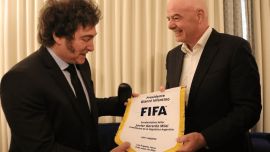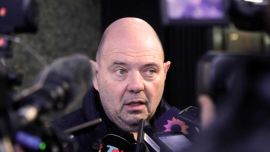After beginning the professional era as a team of nomads, Argentina had finally found a home for their players until the Covid-19 pandemic scattered them to the four corners of the planet.
The great Argentina team that reached the semi-finals of the 2007 World Cup in France was led by the likes of Leinster fly-half Felipe Contempomi, Sale Sharks flanker Juan Martín Fernández Lobbe and Stade Français half-backs Agustín Pichot and Juan Martín 'El Mago' Hernández.
If Argentina manage to repeat that feat by beating Wales in Saturday's quarter-final in Marseille, the country's new heroes will again be a band of exiles.
Back in 2007, Argentine players needed to find foreign clubs to play professionally, until the creation of the Jaguares Super Rugby franchise in 2016.
It was a seminal moment in Argentine rugby.
The Buenos Aires-based team gave players the opportunity to stay at home while still paying top-level club rugby.
Already competing in the southern hemisphere Rugby Championship since 2012, Argentina's players could now also face the best of New Zealand, Australia and South Africa at club level.
Playing all year round together for club and country, Argentine rugby quickly progressed.
The Jaguares reached the Super Rugby final in 2019, in just their fourth season, losing 19-3 to the all-conquering New Zealander Crusaders.
But Covid pulled the rug from under the Jaguares as the 2020 Super Rugby season was abandoned and the teams from Australia and New Zealand created new domestic-based competitions and the South Africans joined Europe's United Rugby Championship.
Argentina's best players were once again forced to wander the earth.
"Our lives changed completely with Covid," said Juan Cruz Mallia, who has managed to land on his feet at French powerhouse Toulouse.
After winning the Top 14 title twice and the European Champions Cup, utility back Mallia has signed a new contract until 2026.
But he would no doubt still be playing for the Jaguares if it were not for Covid.
"They disappeared so we had to start looking for a new club to play professional rugby," added Mallia.
"Now we are all over the world playing in different clubs."
'Competition is everything'
Deprived of the revenue from Super Rugby, or indeed any competition, the Argentine rugby federation could not afford to maintain a fully professional team.
Players like veteran hooker Agustín Creevy had left Worcester Warriors in England to join the Jaguares.
Four years later he was back in England to join London Irish.
Former international flanker Leonardo Senatore says the loss of the Jaguares was "a big step back for rugby in Argentina."
"It was a big change for our rugby. And we have seen that it has affected a lot the way we play because we don't have so much time together to put the pieces together," Senatore told AFP.
There was no immediate decline, though.
In 2020, just months after the Super Rugby season was abandoned, Argentina beat New Zealand for the first time before stunning the All Blacks on home soil two years later.
But under Australian Michael Cheika, the Pumas made a poor start to this World Cup, easily beaten 27-10 by 14-man England.
That left Argentina with two must-win games against Samoa and Japan.
Win they did, but not without a mighty struggle.
And reaching the quarter-finals is always an absolute minimum requirement for Argentina.
If Argentine rugby is to grow once again, Senatore believes the new Super Rugby Americas competition is where that future development lies.
It brings together teams from Uruguay, Chile, Paraguay, Brazil and the United States, alongside the Cordoba-based Dogos XV and Pampas from Buenos Aires.
Both Argentine sides are made up largely of young prospects.
"Competition is everything. If you train, train, train but don't compete with the best, you will never improve," said Senatore.
"It will take more time. It is the hard way to do it.
"But I think in the future, it will be great if South America or America achieve what they want, which is to improve the competition for everyone.
"It will also be really good for world rugby 'cause we need more competition in the South."
related news
by Sébastien Duval, AFP

























Comments